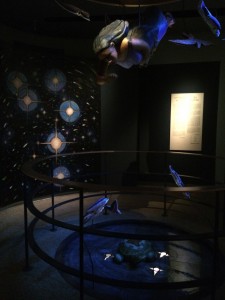
The Women Who Fell From the Sky: a personal photo from a recent visit to the Canadian Museum of History
Thomas King states that creation stories “contain relationships that help to define the nature of the universe and how cultures understand the world in which they exist” (King, 10). He presents us with two such stories, one Native and one Christian, that aim to tell the story of how things came to be. King tells the story of Charm and the story of Genesis, one after the other, in order to highlight their similarities and differences and to also comment on how different ways of thinking and approaching these stories can inform our imaginations and perceptions of the world. The dichotomies that he creates between the two messages in the stories, the two ways in which the stories are delivered, and the two worldviews that these stories represent, serve to emphasize the cultural differences, as well as the universal similarities that exist between the stories. By analyzing these comparisons, the reader is asked to examine the role of authority and the fact that Christian stories are rooted in the ideas of competition and victory, whereas Charms creation story is rooted in the idea of cooperation . The reader is asked to analyze the merits of creating a world of oppositions versus the merits of living in a world of collaboration.

Creation story exhibit in the Canadian Museum of History
The dichotomies that King creates also work to underline the historical context, by which I mean the white privilege, that influences the mindset of those who may interpret the stories. In order to highlight the state of western affairs, King asserts that stories like Charms are forgotten “amidst the thunder of Christian monologues” because “within the North American paradigm we [already] have a perfectly serviceable creation story” (King, 21). King goes on to emphasize the believability of one story (Genesis) over the other (The Women who fell from the Sky) by the way in which he tells the stories so as to underscore the ridiculousness of considering one story as superior and one story as inferior. Indeed, if we believe that only one creation story can be sacred and that all others must be digested only as stories, then we are in danger of asserting our own worldviews on others and subscribing to the dichotomous notion that one must be better than the other. This same ridiculousness is echoed in the oppositional worldview that sees us neglecting each other, hurting ourselves and the environment, and avoiding many difficult realities in the world because we are simply unwilling to cooperate.

Charm at the Canadian Museum of History
King sets the two stories apart by the way he tells them to us. He tells the story of Charm in a storytelling tone in order to open our minds to a new story (for many) and to the fact that other stories have always existed to describe how the world was created. He chooses this tone to diminish the stories authority and to set it up in opposition to the more widely known Christian creation story. This diminished tone also emphasizes the fact that Charms creation story is the lesser-known tale that is overshadowed by a “perfectly serviceable creation story”. King tells the more widely known story of Genesis to an audience with a formal and authoritative tone as if to tell us that this is the way things are. Or at least this is the way that we are told that they are.
King is able to artfully arrange these two creation stories in opposition to one another to highlight the absurdity of doing so. He gives us this analysis in order to give balance and to create equality for the two stories by challenging us to understand that we are allowed to draw from many sources to understand how our world was created. He tells us that once we hear a story it is up to us to decide what it means to us and that it is up to us to decide what to do with it.
Works Cited
“Exhibitions: First People’s Hall”.Canadian Museum of History. N.p., Web. 12 Feb 2014
King, Thomas. The Truth About Stories: A Native Narrative. Toronto: House of Anansi Press Inc., 2003. Print
Tappenen, Sharon. “Aboriginal Dreamtime: Promoting Aboriginal Culture and Arts to the World”, N.p.,Web. 12 FeB 2014.

I really enjoyed your point on the authoritative language used between stories and as you say, “King tells the more widely known story of Genesis to an audience with a formal and authoritative tone as if to tell us that this is the way things are. Or at least this is the way that we are told that they are.” I found when reading the story of Charm, the language seemed to convey a simplicity that was indeed less formal and authoritative, but I agree that this type of tone was overpowered by the language of Genesis.
Hi Paul
I really enjoyed reading your post! I think you articulated a lot of great ideas. “If we believe that only one creation story can be sacred and that all others must be digested only as stories, then we are in danger of asserting our own worldviews on others and subscribing to the dichotomous notion that one must be better than the other.” Very well put. I think King effectively challenges the dichotomous nature of a lot of Judaeo-Christian philosophies, as you have pointed out. And I have to agree with you that these modes of thinking allow, or at least make easier, for injustice and destruction to occur around the world. Sometimes I feel like the “ridiculousness echoed in the oppositional worldview” is something which is deliberately promoted through the institutions which are founded on the Adam-Eve creation story.
Thanks for the read!
-Stepan